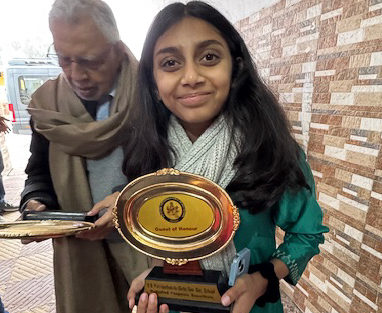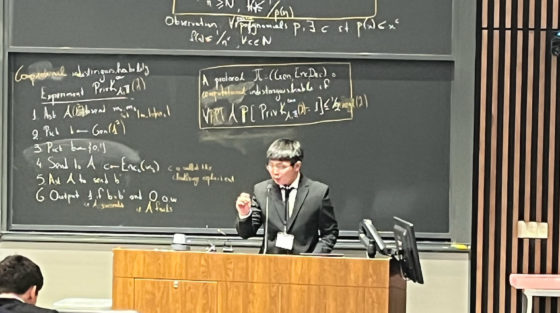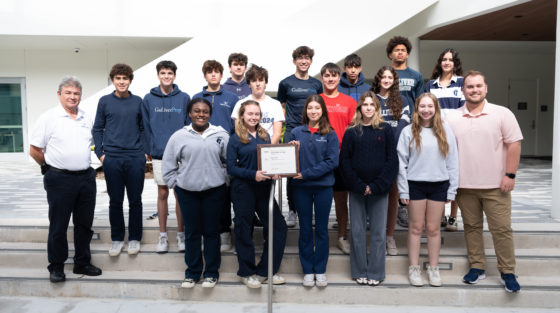 For Mrs. Li-Chun Yang, teaching Mandarin is more than just about language—it’s about opening doors to a new world of possibilities. At the Middle School level, students are introduced to a variety of foreign languages, and among them is Mandarin, one of the world’s most widely spoken languages. Mrs. Li-Chun Yang, a passionate and dedicated Mandarin teacher, plays a key role in introducing her students to the complexities and beauty of this ancient language. Recently, Mrs. Yang was honored with the Most Valuable Teacher Award from the Florida Foreign Language Association, a well-deserved recognition for her outstanding contributions to language education.
For Mrs. Li-Chun Yang, teaching Mandarin is more than just about language—it’s about opening doors to a new world of possibilities. At the Middle School level, students are introduced to a variety of foreign languages, and among them is Mandarin, one of the world’s most widely spoken languages. Mrs. Li-Chun Yang, a passionate and dedicated Mandarin teacher, plays a key role in introducing her students to the complexities and beauty of this ancient language. Recently, Mrs. Yang was honored with the Most Valuable Teacher Award from the Florida Foreign Language Association, a well-deserved recognition for her outstanding contributions to language education.
In a recent conversation, Mrs. Yang shared her thoughts on the opportunities and strategies involved in teaching Mandarin, along with her goals for her students’ language learning journeys.
The Opportunities of Mandarin Language Learning
Mandarin is rapidly becoming one of the most important languages in global business, technology, and diplomacy. According to Mrs. Yang, “Mandarin is becoming increasingly important in global business and technology.” As China continues to play a central role in the global economy, students who master Mandarin will gain valuable skills that are highly relevant to their future careers.
Moreover, Mandarin offers students a gateway to one of the world’s oldest and most influential cultures. “Learning Mandarin connects students to a rich cultural heritage, which can open doors to a deeper understanding of history, art, and philosophy,” Mrs. Yang notes. By learning the language, students also gain a broader understanding of Chinese society, fostering cross-cultural understanding and appreciation.
But beyond the practical benefits, Mrs. Yang believes that Mandarin allows students to see the world through a different lens. “When students learn a language, they don’t just learn words—they learn how to think and see the world differently,” she explains. This shift in perspective not only makes them more globally minded but also enhances critical thinking skills, adaptability, and empathy.
Making Mandarin Fun and Engaging for Middle Schoolers
Keeping Middle School students engaged in a subject like Mandarin, which may feel completely unfamiliar, requires creative strategies. Mrs. Yang is known for her dynamic and interactive teaching style, which incorporates a variety of engaging techniques to make language learning fun.
“Active learning is key,” she says. Mrs. Yang incorporates small group discussions and peer learning activities, encouraging students to practice their Mandarin in a supportive and collaborative environment. These activities not only help reinforce language skills but also allow students to build confidence by learning from each other.
In addition to traditional methods, Mrs. Yang leverages technology to enhance the learning experience. “I use interactive tools like Quizlet and Jeopardy-style games to reinforce vocabulary and grammar,” she explains. Tools like Nearpod, which allows for interactive lessons, help students stay engaged while learning. Gamification, she believes, is a powerful way to make studying Mandarin both fun and educational.
Perhaps most importantly, Mrs. Yang emphasizes cultural integration in her lessons. “I include elements of Chinese culture—festivals, calligraphy, traditional crafts, and songs—to make the language more relatable,” she says. This cultural immersion helps students see Mandarin not just as a language, but as a window into a different way of life. By connecting the language to real-world events and traditions, Mrs. Yang ensures that her students develop a holistic understanding of China’s cultural landscape.
Goals for Mandarin Education
Mrs. Yang’s goals for her students are clear and purposeful. Her primary objective is to spark interest in the Chinese language and culture. “I want my students to discover the beauty of learning Mandarin,” she says. She believes that once students are introduced to the language, they will realize its value and relevance to their own lives.
Beyond cultivating initial interest, Mrs. Yang focuses on building a solid foundation in Mandarin. “I want students to feel comfortable using Mandarin both inside and outside the classroom,” she notes. This is achieved through consistent practice, encouragement, and a curriculum that offers plenty of opportunities for real-world language application.
Finally, Mrs. Yang aims to inspire a long-term commitment to Mandarin language learning. “I hope to motivate students to continue their journey with Mandarin to the Upper School and beyond,” she says. By helping students see the connections between their Mandarin studies and the broader world, she hopes to foster a sense of purpose and curiosity that will drive them to keep learning.
The Challenges of Teaching Mandarin: Turning Difficulties into Opportunities
Every language presents its challenges, and Mandarin is no exception. However, for Mrs. Yang, these challenges are an inherent part of the learning process and, in many ways, offer exciting opportunities for growth.
“Mandarin is a tonal language with a character-based writing system, which is very different from English,” she explains. While this can initially feel intimidating for students, it’s precisely what makes learning the language so rewarding. As students start to grasp how tones affect meaning and how characters communicate ideas, they experience a deep sense of accomplishment. Mrs. Yang sees this as an exciting challenge that builds students’ problem-solving skills and cognitive flexibility.
Another challenge Mrs. Yang faces is maintaining student motivation over time. “Sustaining students’ motivation throughout their language journey can be difficult,” she acknowledges. However, she views this as an opportunity to create a lasting love for learning. By integrating engaging activities, cultural insights, and real-world connections, Mrs. Yang helps her students stay motivated and excited about Mandarin.
“With time and consistent practice, students build their confidence, and the language becomes more intuitive,” she says. Mrs. Yang’s goal is to make sure her students see the value of learning Mandarin not just as a short-term endeavor, but as a lifelong skill that can benefit them in countless ways.
Support Our Faculty:
Mrs. Li-Chun Yang inspires her students by making Mandarin both accessible and exciting through interactive lessons, cultural immersion, and real-world applications. Her innovative teaching methods empower students to explore new languages and cultures, preparing them for a global future. By supporting The Gulliver Fund, you help provide the resources necessary for dedicated educators like Mrs. Yang to continue shaping young minds—click here to donate.

























